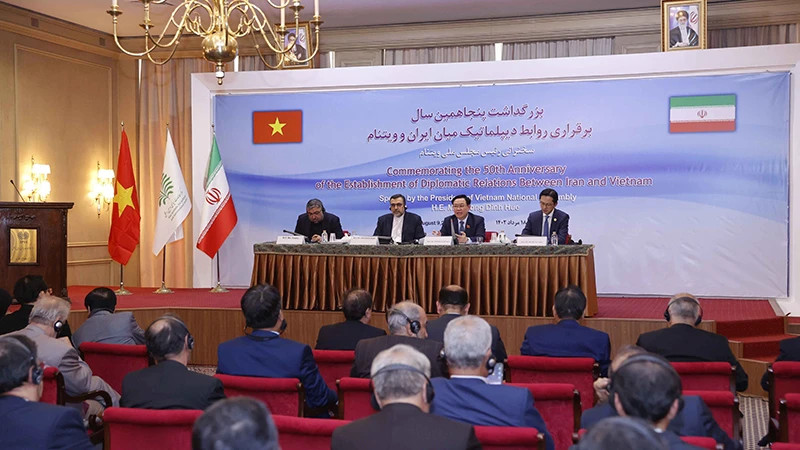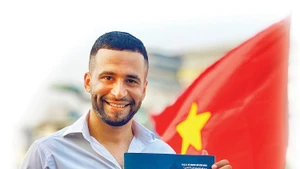Talking to Nhan Dan Newspaper reporters, Iranian Ambassador to Vietnam Ali Akbar Nazari expressed his confidence in the prospects for economic and trade cooperation between the two countries. He also made optimistic assessments of Vietnam's potential to export Halal products to the Iranian market, in addition to traditional export products.
According to Ambassador Nazari, based on the good traditional friendship, Vietnam and Iran have been cooperating in many fields in both a bilateral and multilateral manner and at regional and international scales. However, bilateral cooperation in the economic and trade areas is still not commensurate with the political aspect. The potential for economic, trade and investment cooperation between the two countries is still very large, the economies of Iran and Vietnam can complement each other. As a country with high economic growth, Vietnam is in great need of energy and petrochemical products, while Iran is one of the major exporters of oil and petrochemical products at competitive prices, which can create opportunities for further cooperation between the two countries. In the agricultural sector, Vietnam can provide coffee, tea, and spices to the Iranian market, and Iran can also export agricultural products such as apple, kiwi, and cherry to the Vietnamese market.
In addition to traditional export products, Ambassador Nazari said Vietnam's Halal products also have great potential for export to the Iranian market. Especially, within the framework of the official visit to the Islamic Republic of Iran by National Assembly Chairman Vuong Dinh Hue last August, leaders of the Directorate for Standards, Metrology and Quality (Ministry of Science and Technology) of Vietnam and the Iran National Standards Organisation signed a memorandum of understanding (MoU) on standardisation, conformity assessment, accreditation, metrology, and Halal. This document facilitates the export of Halal food from Vietnam to Iran.
Assessing the potential, diversity and quality of Vietnam's Halal products, Iranian Ambassador Ali Akbar Nazari made important comments and gave suggestions to promote the export of Halal products. He noted that with a population of more than 80 million people, the Islamic Republic of Iran is becoming an attractive destination and a promising market for businesses in the field of Halal products around the world, including from Vietnam. With the diversity and abundance of agricultural and aquatic products, Vietnam can export more Halal products to Iran which has a strategic location in the Middle East and an attractive market for business and trade.
Businesses exporting Halal products to the Iranian market need to meet the standards and requirements of the host country. The removal of barriers and creation of favourable conditions for Vietnamese businesses to export Halal products to the Iranian market requires a combination of strategic approach, cooperation, and compliance with regulations. Developing a strategic approach and full information, along with building relationships and adapting to local preferences, will improve the chances of success in accessing Iran's Halal market. According to the Ambassador, businesses and exporters of Vietnamese Halal products to the Iranian market can easily access procedures and standards of Halal products based on the rules, regulations, and standards of this product in Iran.
The signing of the MoU signifies a common commitment between Vietnam and Iran in trade cooperation, including Halal food. It demonstrates a willingness to streamline processes and facilitate market access. The cooperation in standardisation and assessment of conformity can lead to conformity with international Halal standards. This is very important to ensure that Vietnam's Halal products meet Iran's strict requirements and are accepted by Iranian consumers.
According to the Ambassador, based on this document, several important factors can be proposed to promote cooperation between the two countries. Firstly, the regular communication and dialogue between relevant agencies is necessary to ensure that the provisions of the MoU are effectively implemented. Secondly, the two sides need to organise technical seminars and training courses to improve capacity and facilitate knowledge exchange between experts from the two countries. Thirdly, trade delegations, exhibitions, and business forums will be held to highlight Halal products and promote connections between Vietnamese manufacturers and Iranian importers. Notably, the Iran Chamber of Commerce has an active research department in the field of Halal and the Embassy has carried out the necessary coordination with this agency to connect with Vietnam through the Institute for Africa and Middle East Studies under the Vietnam Academy of Social Sciences.
Vietnam and Iran have significant potential to promote Halal food exports from Vietnam in Iran. By focusing on education, technical assistance, information sharing, and cooperative initiatives, both countries can pave the way for successful and sustainable cooperation in the field of Halal. The cooperation not only brings commercial benefits but also contributes to strengthening bilateral relations between the two countries.
















